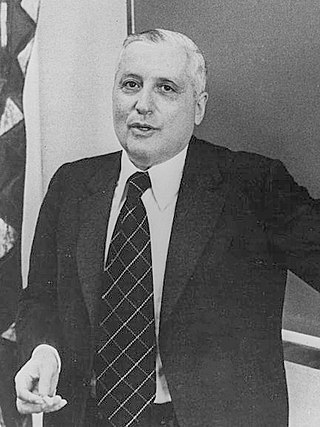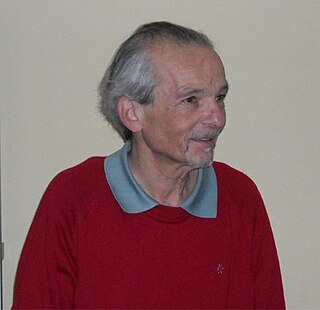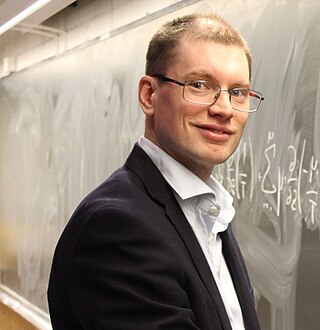Related Research Articles
In physics, statistical mechanics is a mathematical framework that applies statistical methods and probability theory to large assemblies of microscopic entities. Sometimes called statistical physics or statistical thermodynamics, its applications include many problems in the fields of physics, biology, chemistry, neuroscience, computer science, information theory and sociology. Its main purpose is to clarify the properties of matter in aggregate, in terms of physical laws governing atomic motion.

Josiah Willard Gibbs was an American scientist who made significant theoretical contributions to physics, chemistry, and mathematics. His work on the applications of thermodynamics was instrumental in transforming physical chemistry into a rigorous deductive science. Together with James Clerk Maxwell and Ludwig Boltzmann, he created statistical mechanics, explaining the laws of thermodynamics as consequences of the statistical properties of ensembles of the possible states of a physical system composed of many particles. Gibbs also worked on the application of Maxwell's equations to problems in physical optics. As a mathematician, he created modern vector calculus and described the Gibbs phenomenon in the theory of Fourier analysis.

Viscount Ilya Romanovich Prigogine was a Belgian physical chemist of Russian-Jewish origin, noted for his work on dissipative structures, complex systems, and irreversibility.
The fluctuation theorem (FT), which originated from statistical mechanics, deals with the relative probability that the entropy of a system which is currently away from thermodynamic equilibrium will increase or decrease over a given amount of time. While the second law of thermodynamics predicts that the entropy of an isolated system should tend to increase until it reaches equilibrium, it became apparent after the discovery of statistical mechanics that the second law is only a statistical one, suggesting that there should always be some nonzero probability that the entropy of an isolated system might spontaneously decrease; the fluctuation theorem precisely quantifies this probability.

Non-equilibrium thermodynamics is a branch of thermodynamics that deals with physical systems that are not in thermodynamic equilibrium but can be described in terms of macroscopic quantities that represent an extrapolation of the variables used to specify the system in thermodynamic equilibrium. Non-equilibrium thermodynamics is concerned with transport processes and with the rates of chemical reactions.
The Jarzynski equality (JE) is an equation in statistical mechanics that relates free energy differences between two states and the irreversible work along an ensemble of trajectories joining the same states. It is named after the physicist Christopher Jarzynski who derived it in 1996. Fundamentally, the Jarzynski equality points to the fact that the fluctuations in the work satisfy certain constraints separately from the average value of the work that occurs in some process.

Denis James Evans is an Australian scientist who is an emeritus professor at the Australian National University and honorary professor at The University of Queensland. He is widely recognised for his contributions to nonequilibrium thermodynamics and nonequilibrium statistical mechanics and the simulation of nonequilibrium fluids.
The Crooks fluctuation theorem (CFT), sometimes known as the Crooks equation, is an equation in statistical mechanics that relates the work done on a system during a non-equilibrium transformation to the free energy difference between the final and the initial state of the transformation. During the non-equilibrium transformation the system is at constant volume and in contact with a heat reservoir. The CFT is named after the chemist Gavin E. Crooks (then at University of California, Berkeley) who discovered it in 1998.

Joel Louis Lebowitz is a mathematical physicist widely acknowledged for his outstanding contributions to statistical physics, statistical mechanics and many other fields of Mathematics and Physics.
Dmitry Nikolayevich Zubarev was a Soviet and Russian theoretical physicist known for his contributions to statistical mechanics, non-equilibrium thermodynamics, plasma physics, theory of turbulence, and to the development of the double-time Green function's formalism.
Ezechiel Godert David "Eddie" Cohen was a Dutch–American physicist and Professor Emeritus at The Rockefeller University. He is widely recognised for his contributions to statistical physics. In 2004 Cohen was awarded the Boltzmann Medal, jointly with Prof. H. Eugene Stanley. Cohen's citation read "For his fundamental contributions to nonequilibrium statistical mechanics, including the development of a theory of transport phenomena in dense gases, and the characterization of measures and fluctuations in nonequilibrium stationary states."

Bernard Howard Lavenda is a retired professor of chemical physics at the University of Camerino and expert on irreversible thermodynamics. He has contributed to many areas of physics, including that of Brownian motion, and in the establishment of the statistical basis of thermodynamics, and non-Euclidean geometrical theories of relativity. He was the scientific coordinator of the "European Thermodynamics Network" in the European Commission Program of Human Capital and Mobility. He was also a proponent for the establishment of, and scientific director of, a National (Italian) Centre for Thermodynamics, and has acted as scientific consultant to companies such as the ENI Group, where he helped to found TEMA, a consulting firm for SNAM Progetti, ENEA, and the Solar Energy Research Institute in Golden, Colorado. He has had over 130 scientific papers published in international journals, some critical of the new fashions and modes in theoretical physics.

Alexander Nikolaevich Gorban is a scientist of Russian origin, working in the United Kingdom. He is a professor at the University of Leicester, and director of its Mathematical Modeling Centre. Gorban has contributed to many areas of fundamental and applied science, including statistical physics, non-equilibrium thermodynamics, machine learning and mathematical biology.
Robert Walter Zwanzig was an American theoretical physicist and chemist who made important contributions to the statistical mechanics of irreversible processes, protein folding, and the theory of liquids and gases.
Stochastic thermodynamics is an emergent field of research in statistical mechanics that uses stochastic variables to better understand the non-equilibrium dynamics present in many microscopic systems such as colloidal particles, biopolymers, enzymes, and molecular motors.
Vladimir Nikolajevich Pokrovskii is a Russian scientist known for his contributions to polymer physics and economic theory.
Christopher Jarzynski is an American physicist and distinguished university professor at University of Maryland's department of chemistry and biochemistry, department of physics, and institute for physical science and technology, and fellow of the National Academy of Sciences. He is known for his contributions to non-equilibrium thermodynamics and statistical mechanics, for which he was awarded the 2019 Lars Onsager Prize. In 1997, he derived the now famous Jarzynski equality, confirmation of which was cited by the Nobel Committee for Physics as an application of one of the winning inventions of the 2018 Nobel Prize in physics—optical tweezers.
Katja Lindenberg is an Ecuadorian-American theoretical chemical physicist whose research concerns statistical mechanics, stochastic processes, non-equilibrium thermodynamics, and quantum thermodynamics. She is Distinguished Professor of Chemistry and Chancellor's Associates Endowed Chair Emeritus at the University of California, San Diego.
Jan Vincent Sengers is a Dutch–American physicist and a distinguished university professor emeritus at the Institute for Physical Science and Technology of University of Maryland. He is known for seminal contributions in critical and non-equilibrium phenomena in soft condensed matter.

Øivind Wilhelmsen is a Norwegian professor of physical chemistry at the Norwegian University of Science and Technology in Trondheim (NTNU), Norway. There he is head of the Thermodynamics group and serves as principal investigator at PoreLab, a Center of excellence. His area of research is thermodynamics, with emphasis on non-equilibrium thermodynamics.
References
- ↑ G. Crooks, "Nonequilibrium Measurements of Free Energy Differences for Microscopically Reversible Markovian Systems", Journal of Statistical Physics, 90, 1481 (1998)
- ↑ Steven Brenner
- ↑ "President Honors Outstanding Early-Career Scientists | The White House". Office of Science and Technology Policy . Archived from the original on 28 January 2017. Retrieved 19 July 2020– via National Archives.
- ↑ "Gavin E. Crooks". Google Scholar . Retrieved 30 March 2022.